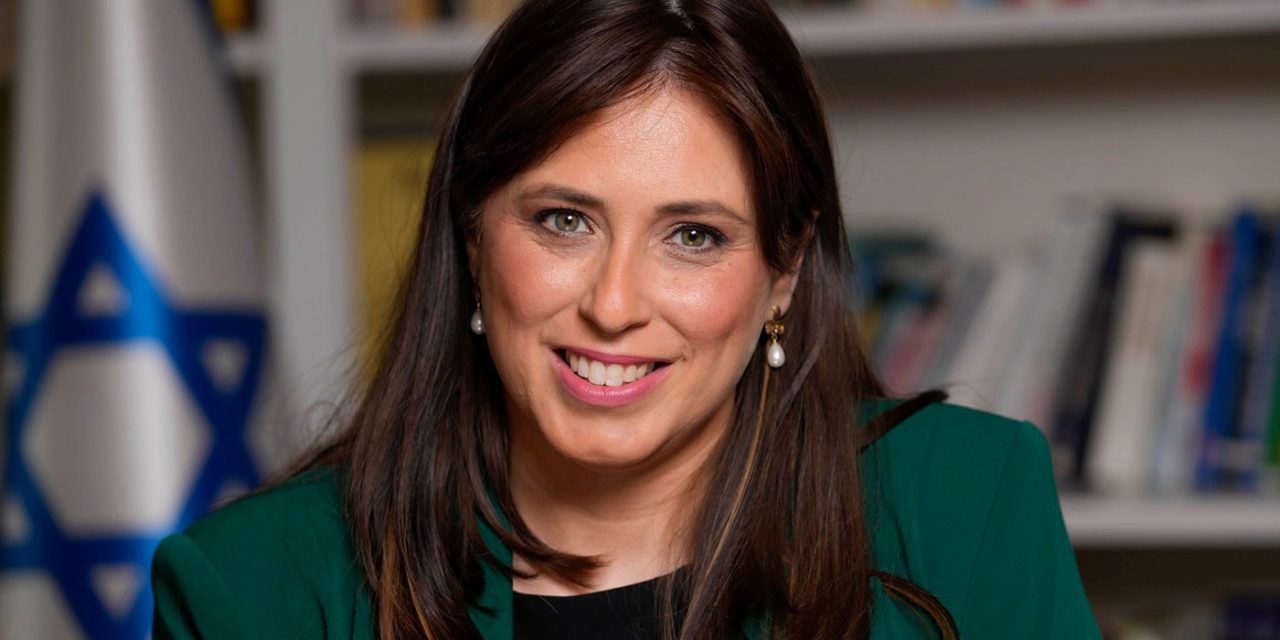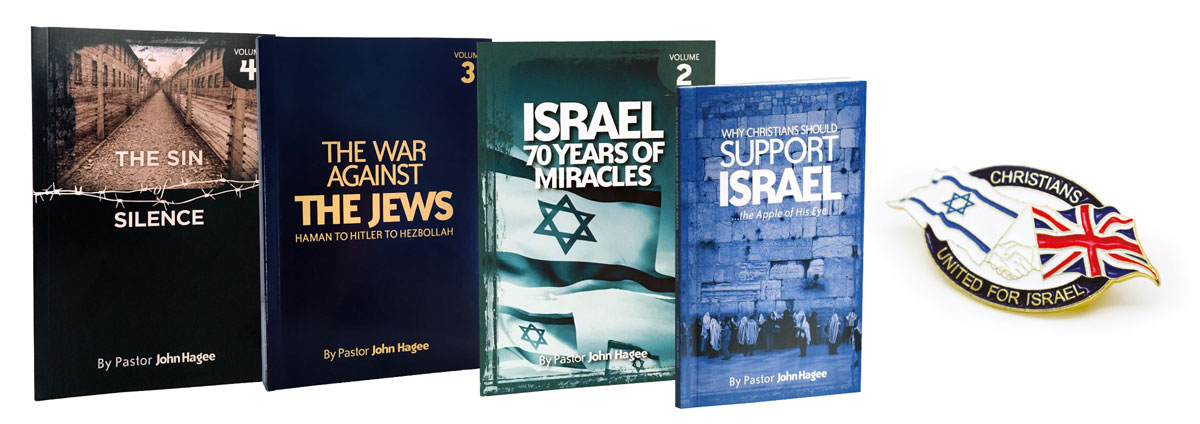This article first appeared in the CUFI UK Torch Magazine (Issue 20, Winter 2022). For the latest issue, see here.
We are honoured that Israel’s Ambassador to the UK kindly accepted our invitation to speak to Christians United for Israel about a range of topics.
You may have heard Ambassador Hotovely robustly defending Israel on TV and radio during the May 2021 conflict, combating bias and misinformation. Meanwhile, her role has proven vitally important at a time of new opportunities for Britain and Israel to work together more closely in the future.
HE Mrs Tzipi Hotovely is the 18th Ambassador of Israel to the Court of St James’s, and the first woman to be appointed to the position.
Ambassador Hotovely previously held a number of roles in the Israeli Government, including Deputy Minister of Foreign Affairs (2015-20). She also served as a Member of Knesset (2009-20), Israel’s parliament, where she chaired the Women and Gender Equality Committee (2009-13).
CUFI: Ambassador, it is just over a year since you arrived in the UK to take up your position at the Israeli embassy, notably in the middle of a second national lockdown. What has it been like for you settling in the UK? Please also tell us a little about your lovely family.
Ambassador: I am the mother of three young girls: the eldest is seven, the middle five, and my little one is three.
The Covid lockdown was a very difficult time to start living in a new country, especially since a big part of my Jewish life was not in practice due to the restrictions.
The initial stage when my girls were not at school was especially challenging. Thankfully, everything is much better now schools have reopened, giving them the opportunity to learn English and make new friends.
My husband, Or, found it slightly easier to settle as he has always loved London and he works remotely, so he is still doing what he is au fait with.
We’re still missing the sun, but I’m enjoying the warm welcome I’ve received, especially now that face-to-face meetings are possible, which build real, personal connections.

We imagine you don’t have much free time outside your diplomatic role, but what are some of your favourite things about London and the UK so far?
When I get free time, I love to read, and I use my weekends to read a lot. The UK is a great place for this. I love the countryside, where you can just relax with a book and enjoy nature.
Whenever we travel within the UK, we discover how much natural beauty this country truly has to offer. The Scottish Highlands are especially beautiful.
London also has its own flare, which is an opportunity to learn and explore British culture, which is just fascinating.
Britain rightly sees Israel as one of its closest allies. How would you assess the current relationship between the UK and Israel?
British journalist Jake Wallis Simons recently described this as “the Golden era” in UK-Israel relations. As Ambassador to the UK, this is something I have also personally felt, and it is wonderful to see that we are enjoying a flourishing diplomatic relationship.
One of reasons is the fact that we share important values, vibrant democracies, and together we are building better trade connections. We have a deep cooperation the areas of intelligence and security, and these are the arenas in which both countries are doing a great deal to save lives.
One of the most impressive examples of our cooperation is in response to Covid. Israel sees Britain as a role model because from the beginning it was clear that the UK government’s paradigm was for normal life to continue as much as was safe and possible. Israel is following British policy, and in turn, Britain is following the Israeli vaccine rollout, which has been an immense success.
We have a good cooperation on trade, security and health, and in all three areas, there is lots of mutual support and intensive collaboration.
During the last visit of Israeli Foreign Minister Yair Lapid, we signed a very special bilateral agreement to build a close strategic partnership, similar to what we have with our friends in the US. This commitment reveals a lot about where diplomatic relations are right now. They were strong to begin with, but they are only getting stronger.
Britain has a very important legacy of Zionism based upon its Judeo-Christian values. How has your own Jewish faith contributed to your political and diplomatic roles in advocating for Israel?
Judaism is a very significant ingredient in my identity, and in my personality. I grew up in a very Zionist family and my Jewish roots have always been intrinsic to who I am.
Today more than ever, inter-faith dialogue is also very important and one example of this is the signing of the Abraham Accords, which signal a big change in the Middle East. Even the name represents the history we have in common.
Faith holds a special place in the Middle East, and in meetings with Arab colleagues there is a mutual feeling that we share similar beliefs. Ultimately, we are all moderates who view religion as a positive force, bringing hope to the entire region. This is the hope that Muslims and Jews can live peacefully and effectively together.
Developing more connections between religions communities brings so much positive change. We see this in the Judeo-Christian connection, which is strong. The work of Christians and Jews working together is helping to foster understanding, ecumenism, and to show Israel as a force for good in the world.
The Jewish connection to Israel is biblical and I think many Christians understand this well, and in their advocacy they are therefore able to detail the history and archeology that ties us to the land. Our Christian friends can do this precisely because of their heart for Israel and its rich, longstanding history.

Prime Minister Boris Johnson lights a menorah at 10 Downing Street as Israeli Foreign Minister Yair Lapid and Amb. Tzipi Hotovely look on.
In November last year, your visit to the London School of Economics (LSE) made headlines after the appalling harassment you received from pro-Palestinian protesters. In the same month a report was published about the rising cases of anti-Semitic cases on UK campuses linked to May’s 11-day Gaza conflict. How would you assess the current climate on campuses, and how can these challenges be addressed?
University campuses were created as places to exchange ideas and develop students who are open to hearing different points of view. To try to silence me goes against this very basic tenant of academic life and freedom of speech.
After the incident at LSE, I realised just how supportive the British government is, as the PM, the Foreign Secretary and countless others condemned the acts. Home Secretary Priti Patel made it very clear that the incident would be investigated to ensure that every ambassador can walk onto campus without fearing an attack.
The spirit of the message after the event made it very clear that those kinds of violent threats should not happen, and it is right that they were condemned.
I was invited by students of LSE, and I came for an open discussion. Radicals who do not desire peace came to block this opportunity – an opportunity they had to ask me questions, to generate dialogue. In the end, we had an event with around 200 students that lasted for over one hour, and was very successful.
Turning our attention to Israel, what do you believe are the greatest challenges facing Israel’s security now and in the near future that CUFI supporters need to be aware of?
By far the greatest security challenge to Israel is Iran’s aim to secure nuclear weapons. As our Prime Minister Naftali Bennett and Foreign Minister Yair Lapid have made clear, we will do everything to fight this ambition, which is essentially an existential threat to our State.
The Iranian regime poses a significant threat, not only to Israel but also to the entire world. The British government understands this very well, and we have a strong alliance in countering Iran’s nuclear aims.
CUFI UK has called for Britain to recognise Jerusalem as the capital of Israel and move the UK embassy there from Tel Aviv. We’ve seen a number of countries do this or begin the process. Would you mind sharing why doing so has been important for Israel and the respective countries?
The answer is simple: all embassies should be located in our capital, as is the practice all over the world.
After the USA moved their embassy from Tel Aviv to Jerusalem, many people thought it would encourage violence, but in fact, the opposite is true. Jerusalem is a vibrant city where Arabs and Jews live together in peace, and the presence of the embassy does not increase tensions in any way.
Jerusalem has been our capital for over 3,000 years, and no one can deny this connection The diplomatic and just thing to do is to respect history, and it is for this reason that we ask all embassies to locate themselves in Jerusalem. I hope that we will soon see the right moment for Britain to make this move.

Amb. Tzipi Hotovely with the UK Abraham Accords Group at Houses of Parliament: Amb. Mansoor Abulhoul (UAE), James Cleverly, Dr Anwar Gargash (UAE), Liam Fox and Fahad Albinali (Bahrain).
You arrived as ambassador at a time of significant peace agreements in the Middle East, with the breakthrough Abraham Accords normalising ties between Israel and four Arab nations. (a) What are the implications of this and (b) do you think there is anything Britain can do supportively to widen the circle further in the region?
The implications of normalisation are vast, in terms of both regional stability, economic benefits via business opportunities and people-to-people exchanges.
Britain can certainly play an important role in this process. The UK has always been deeply connected to the Gulf countries and when friends can speak in the same voice, it is very powerful. The UK publicly celebrated the first anniversary of the Abraham Accords at an event at the Houses of Parliament in September last year, which reflects Britain’s commitment to furthering these ties.
The recent drone attack in Abu Dhabi clearly demonstrates that the threat of radical terror is a danger to us all, and we are strongly united against it. Britain plays a major role in further bringing us together in our shared aims, as an important power that knows both sides well and can develop peaceful ties.
Tens of thousands of Christians in the UK support Israel through CUFI. What advice or encouragement would you give individuals who are looking to support Israel further?
The State of Israel deeply appreciates and recognises both the friendship and efforts of Christian advocates here in the UK who showcase the best of Israel. We have a strong relationship with the British government, but it is clear that there is a gap in the public perception of Israel and this is the challenge we have.
Aside from continuing the effort, I think it is important to also adapt and innovate. The new battleground is social media. Educating youth is important to ensure that support for Israel continues forward, even as the nature of information exchange and advocacy shifts.
Unfortunately, the media can often greatly distort or simplify the situation in Israel at a given moment, and it is advocates who have the real ability to use their own platforms and take to social media to offer people an alternative vision of what Israel really is, and what life is like for Israelis, whether Jewish or Arab.
If individuals remain engaged, informed and continue to spread the message, including to those who only know about Israel via the media, I think this is a significant contribution.
Related Articles:












